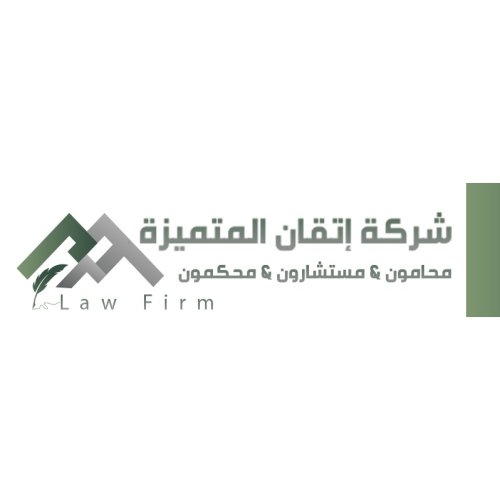Best Child Custody Lawyers in Jeddah
Share your needs with us, get contacted by law firms.
Free. Takes 2 min.
Free Guide to Hiring a Family Lawyer
List of the best lawyers in Jeddah, Saudi Arabia
About Child Custody Law in Jeddah, Saudi Arabia
Child custody in Jeddah, Saudi Arabia, is governed by Sharia law, which plays a central role in family law matters across the country. The decision regarding who gets child custody after a divorce or separation typically aims to serve the best interests of the child, although cultural and religious considerations are fundamental in these decisions. Typically, custody of young children is granted to mothers, provided certain conditions are met, while fathers are usually recognized as the wolves. Children's custody cases are evaluated individually, taking into account the welfare, security, and environment provided by the custodial parent.
Why You May Need a Lawyer
Securing legal guidance can be essential for several reasons if you're involved in a child custody case in Jeddah, Saudi Arabia. A lawyer can help you navigate the complexities of the Sharia-based legal system, especially if you are unfamiliar with local customs and regulations. Situations where legal assistance is beneficial include negotiating custody agreements, representing you in court if a custody dispute arises, or assisting with international custody issues if one parent resides outside of Saudi Arabia. Additionally, understanding your rights and obligations as a custodial or non-custodial parent can ensure that the arrangements are fair and in the child's best interests.
Local Laws Overview
Key aspects of local laws affecting child custody in Jeddah are deeply rooted in Islamic principles. Mothers typically hold the right to custody of children under a certain age, often up to seven for boys and nine for girls, provided they meet specific moral and legal criteria. However, fathers have guardianship rights, which include decision-making regarding the child's education and religious upbringing. Important considerations in custody decisions include the moral character of the parent, their ability to provide care, and the living conditions they can offer.
Frequently Asked Questions
What factors are considered when determining child custody?
Child custody decisions are influenced by the age and gender of the child, the moral character of the parents, and the best interests of the child. The court evaluates both parents’ ability to provide a nurturing environment.
Can fathers obtain custody of their children?
Yes, fathers can obtain custody, especially as children grow older. Custody decisions are largely influenced by the case specifics and the ability of the father to care for the child.
At what age can children decide which parent to live with?
The court primarily decides custody arrangements based on the child’s best interests, and while a child's preference may be considered, it is not solely decisive.
Is there joint custody in Jeddah, Saudi Arabia?
Joint custody is not a common arrangement under Saudi law. Custody is typically awarded to one parent, although visitation rights for the non-custodial parent are usually granted.
What rights do non-custodial parents have?
Non-custodial parents are typically granted visitation rights and remain involved in significant decisions concerning their children's welfare, education, and healthcare.
How does remarriage affect child custody?
If the custodial parent remarries, the court may review the custody arrangement to ensure the child’s welfare is not adversely impacted by the new marriage.
Can custody arrangements be modified post-divorce?
Yes, custody arrangements can be revised if there is a substantial change in circumstances impacting the child's welfare.
What happens in the case of international custody disputes?
International custody disputes can be complex and may require specialized legal assistance, including understanding international treaties and laws applicable in Saudi Arabia and the other country involved.
How long do custody proceedings typically take?
The duration of custody proceedings can vary significantly depending on the complexity of the case. Simple agreements may take a few months, while contested cases can last much longer.
Do courts prefer one gender over another in custody decisions?
Custody is not necessarily biased toward any gender, as decisions aim to favor the child's best interests based on several factors, not merely the parent's gender.
Additional Resources
For those seeking further assistance, the following resources may be helpful:
- Ministry of Justice, Saudi Arabia: They provide legal information and resources applicable to family law matters.
- Local Family Law Attorneys: Specialized lawyers can offer advice and representation specific to your situation.
- Non-Governmental Organizations (NGOs) Focused on Family Welfare: These organizations often provide support services and guidance for individuals in custody disputes.
Next Steps
If you are in need of legal assistance with child custody in Jeddah, consider taking the following steps:
- Consult with a family lawyer who specializes in Saudi family law to understand your rights and obligations.
- Gather all necessary documentation, including marriage certificates, identification documents, and any existing custody agreements.
- Discuss with your lawyer the potential for mediation or negotiation as a first step to resolve disputes amicably.
- Prepare for court proceedings if necessary, with the guidance of your legal counsel to ensure your case is presented effectively.
Lawzana helps you find the best lawyers and law firms in Jeddah through a curated and pre-screened list of qualified legal professionals. Our platform offers rankings and detailed profiles of attorneys and law firms, allowing you to compare based on practice areas, including Child Custody, experience, and client feedback.
Each profile includes a description of the firm's areas of practice, client reviews, team members and partners, year of establishment, spoken languages, office locations, contact information, social media presence, and any published articles or resources. Most firms on our platform speak English and are experienced in both local and international legal matters.
Get a quote from top-rated law firms in Jeddah, Saudi Arabia — quickly, securely, and without unnecessary hassle.
Disclaimer:
The information provided on this page is for general informational purposes only and does not constitute legal advice. While we strive to ensure the accuracy and relevance of the content, legal information may change over time, and interpretations of the law can vary. You should always consult with a qualified legal professional for advice specific to your situation.
We disclaim all liability for actions taken or not taken based on the content of this page. If you believe any information is incorrect or outdated, please contact us, and we will review and update it where appropriate.















